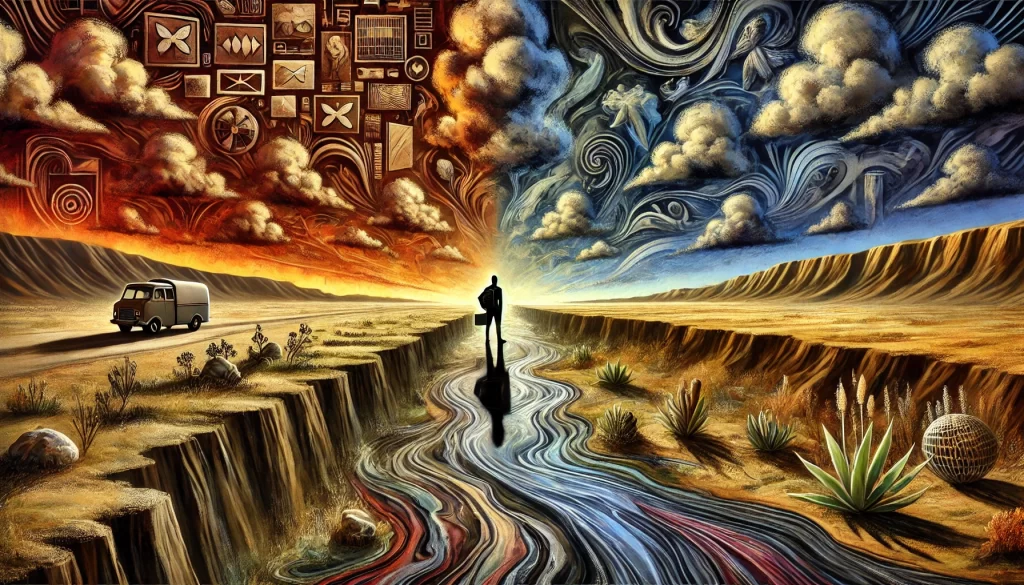
It’s too easy to point the finger at social media and modern mainstream platforms and leave it at that.
Blaming today’s media for the spread of misinformation is a neat, tidy conclusion that absolves us of responsibility. But the uncomfortable truth is that history — our understanding of it, our telling of it, and even our forgetting of it — has always been manipulated. Long before algorithms, long before echo chambers, humans revised history to serve the interests of the powerful. And while the tools may have evolved, the underlying tendency hasn’t changed. Control the story, and you control perception.
Control perception, and you control people.
We don’t have to look far for evidence. The sanctioned histories written by imperial powers are rife with distortions, omissions, and carefully curated half-truths that suited their agendas. This wasn’t some distant, ancient past — it was only a few generations ago. Entire civilizations were plundered and subjugated, and then their stories were rewritten by those who did the plundering. They didn’t just control the resources; they controlled the narrative.
But here’s where it gets even more complicated: when the tides eventually turned and nations began to reclaim their freedom, many didn’t bother to clean up the historical record. The work of correcting, of questioning, of untangling the lies from the truth was rarely done with any rigor. Sometimes it was apathy. Sometimes the new power simply took over the old machinery and started writing its own story to serve its own purposes. The cycle continued. The ink changed hands, but the pen never really stopped writing what served those in charge.
So yes, social media has made it faster, louder, and more chaotic. The real-time speed, the global reach, the obsession with clicks and subscriptions — they certainly supercharge the distortion. But that’s not where the story begins or ends. The deeper question is why we, as individuals, so easily accept what we are told. Why are we so willing to be convinced? Why do we stop at the first answer that feels comfortable? This is not just about the technology that feeds us information — it’s about the psychology that decides what we choose to believe.
Daniel Kahneman, in his brilliant work on cognitive biases, reminds us that humans are naturally prone to “cognitive ease” — we tend to believe things that are familiar, easy to process, and that fit comfortably within our existing worldview. The more times we see something, the more likely we are to accept it as true, even if it isn’t. Social media thrives on this. It’s not a conspiracy; it’s an exploitation of a well-known human vulnerability. But this weakness has been there all along. The difference, though, is, we now have more access than ever before — not just to bad information, but to good information, to the real stories, to the messy, complicated, inconvenient truths.
The question then becomes: where is our agency in all of this? We don’t live in an age of scarcity when it comes to information. If anything, we are drowning in it. Yes, there is a flood of falsehoods, but right next to it there is a treasure trove of authenticity, of scholarship, of lived experience that challenges the dominant narrative. The problem is, many of us aren’t putting in the work to find it. We stop scrolling when we find what we want to believe. We call it “truth” because it fits neatly into our existing story of the world.
The historian Yuval Noah Harari argues that humans live by shared myths — stories that create social cohesion and guide collective action. These myths can be powerful forces for good, but they can also entrench division and perpetuate ignorance if left unquestioned. Stories shape societies, but unchecked, they can also trap them.
We are not just passive victims of misinformation. We participate in it, sometimes willingly. And we can’t just blame the imperialists of the past or the tech giants of the present. At some point, we have to ask ourselves whether we truly value the pursuit of truth, or whether we just want to be comfortable.
It’s not enough to say we are being misled. As true as that is, we must also ask why we so often prefer to stay that way. There is effort involved in digging deeper, in questioning hard, in choosing conviction over convenience. There’s a cost to curiosity. But there’s also a cost to apathy — a slow erosion of our ability to think critically, to decide for ourselves, to hold firm when the winds of popular opinion blow in a different direction.
It is tempting to think this is a modern problem, but it is a deeply human one. The tools have changed, but the underlying dynamics have not. Power rewrites stories. People fall for stories that suit them. And somewhere in the middle, truth gets lost — not because it’s unavailable, but because we didn’t go looking for it.
We often speak about the age of misinformation, but perhaps what we are really in is an age of chosen narratives. The overwhelming access we now have is not just a blessing or a curse — it is a test. A test of our discernment, of our patience, of our willingness to stretch beyond the comfortable answers and resist the lure of easy explanations. A test of whether we will exercise our agency or surrender it.
Maybe the real question is not who is doing the fooling — but why we so often let ourselves be fooled.